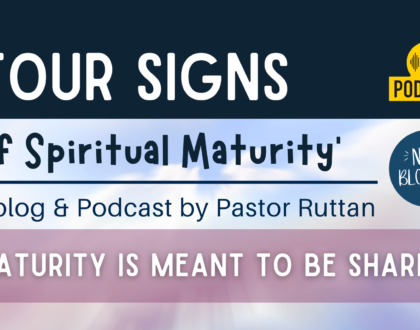Does Atheism Require Blind Faith?
by Westminster
I sometimes hear people say something like this: “I’m an atheist. I don’t believe in God or in life after death because I’m too rational. I’m too scientific to believe in that stuff.”
So the point of this post is to put in writing some of the things I share with people in one-on-one conversations. I want to highlight the fact that atheism, science and reason aren’t necessarily the kissing cousins that many people think they are, and that some forms of atheism actually do require blind faith.
In other words, atheism carries assumptions and ideas that you can’t prove are true. But first, some explanations.

What is “blind faith”?
“Blind faith” is when you think certain things are true without any tangible or measurable evidence. It’s as if you’re operating “blind.”
Next, let me define atheism.
In general, atheism is the belief that God doesn’t exist. But within atheism, I think there are two main kinds.
Material Atheism
The first is what I call “material atheism.” A material atheist would say that they don’t believe in God because they can’t see or measure God. They state—quite honestly—that their knowledge is based on (and limited to) their senses.
And do you know what? I respect that. If you ask a material atheist whether or not there is life after death they would simply need to say they don’t know for sure. The reason they don’t know is because they can’t see or measure life after death (at least not yet). Therefore, they simply don’t know for sure whether there is life after death—although they’ve obviously guessed that there isn’t or else they probably wouldn’t be an atheist.
(I would say that material atheism is close to what is called agnosticism.)
Grey Atheism
But the second kind of atheism is what I call “grey atheism.” And my guess is that most people who say they don’t believe in God or life after death are actually grey atheists.
The word “grey” refers to an uncertain middle where beliefs haven’t really been examined very closely. It’s the vague idea that you can’t believe in God or the afterlife and still be a rational or “scientific” person at the same time.
Whereas material atheists acknowledge that there is much they don’t know (because they realize their senses are limited), a grey atheist goes further and makes a whole series of assumptions about what is true and not true—none of which can actually be proven.
From my own observation, these views aren’t usually the result of serious, sustained thought. They’ve been absorbed from our Western culture, or adopted from blogs, the random observations of friends, or talking heads on the T.V. or radio.
Atheism and Blind Faith
I say all of this because I want to highlight the fact that some forms of atheism actually do require blind faith. In other words, they carry assumptions and ideas that you can’t prove are true.
Here’s an example.
You can’t prove that there is no life after death. The fact that bodies decompose is not proof that nothing happens to one’s personality or consciousness (or soul). To say anything else requires… blind faith. It requires the un-provable assumption that the only real facet of human existence is physical existence—and that when a heart stops, so does everything else. It’s a fine idea. But you simply can’t prove it. It requires an un-provable assumption about the nature of reality.
Perhaps what confuses many grey atheists is that they have mistakenly drawn a 1-to-1 correlation between measurable data and truth. They assume that if you can’t see or measure something it is somehow untrue or of lesser value than things you can see and measure. But if this were the case, forgiveness, love, guilt or joy would be somehow less true than something like gravity.
But none of us actually live like that.
In my view, a more accurate assessment of things is that religion requires a certain element of blind faith—albeit rooted in the idea that God can and does reveal himself, and teach his ways, to humans. But, as I’ve discussed, so do some forms of atheism.
Theological philosopher David Bentley Hart goes so far to say that atheism isn’t a cogent position or even intellectually valid and “must be regarded as a superstition.” I’m not sure I’d go that far; but I see what he’s getting at. He’s chipping away at the cultural lie many of us are fed that rationality and atheism are star-crossed lovers.
Follow the Evidence
One final point. When humans assess what is true or false, they need to follow the evidence. You take a look around with whatever tools you have at your disposal and draw conclusions.
But since you can’t see or measure God that doesn’t mean there isn’t evidence for his existence. Three of the biggest and most convincing evidences are called the argument from morality, the argument from cosmology, and the argument from design. (To see my own summary of these arguments you can link to a pdf I put together here.)
Related to the argument from design, and speaking about the sophistication and seeming intelligence implanted in our universe, the late Stephen Hawking—a theoretical physicist and the Director of Research at the Centre for Theoretical Cosmology within the University of Cambridge—wrote that he thought there were “religious implications” to the fine-tuning of the universe. Why did he say this? Because he did his best to follow the evidence.
So, does grey atheism require blind faith? Yes. It requires a series of assumptions about what is true or untrue—assumptions you can’t objectively “prove.” In this way, it shares some things in common with religious faith.
Do you think there is such a thing as right or wrong? Do you think there is (or isn’t) life after death? Do you think God does (or doesn’t) exist? Your conclusions—no matter what they are—all carry underlying assumptions that require a certain element of “blind faith.” Science is neutral on the question of God’s existence and life after death. And the atheist has no monopoly on reason.
My Reasons for Belief
Let me end with a final, personal note. I believe in God for two main reasons:
The first is that I’ve come to believe that the resurrection of Christ actually happened and that his teachings offer the most hope for our world and its future.
And the second is this: After I looked at whatever evidence I could collect, the existence of God was the most logical explanation for our world, and for how and why we are here.
I believe in God not in spite of reason, but because of it. I simply don’t have enough blind faith to be an atheist.
According to data marshaled in the Washington Post, the world is becoming more religious, not less. 4 out of 5 people on earth believe in God or some kind of higher power. Although the landscape is shifting in North America, nothing in the modern era his significantly altered this trend. And when it comes to global Christianity, there are 50,000 new adherents per day. Perhaps more people than we expect continue to think that some sort of divine reality is the most logical explanation for our world, and for how and why we are here.
I firmly believe that people who believe in God should take seriously the assumptions that underlay both their beliefs and doubts. But so should skeptics.
The challenge for we humans is to truthfully examine those assumptions (whatever they are), respect that there is a diversity of opinions, and follow the evidence. Albert Einstein said it well, “Curiosity has its own reason for existing.”
Recommended Posts

Four Signs of Spiritual Maturity
April 25, 2024
![Firm Faith in the Resurrection [Series Summary]](https://westminsterpc.ca/wp-content/uploads/2024/04/Apr.21-Sunday-Slides-Presentation2-420x330.jpg)
Firm Faith in the Resurrection [Series Summary]
April 18, 2024
